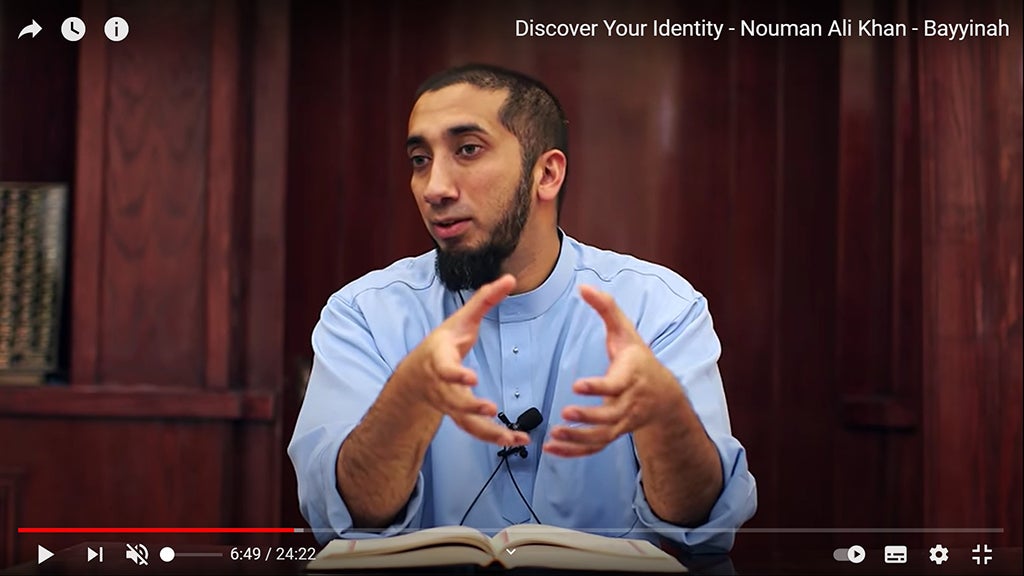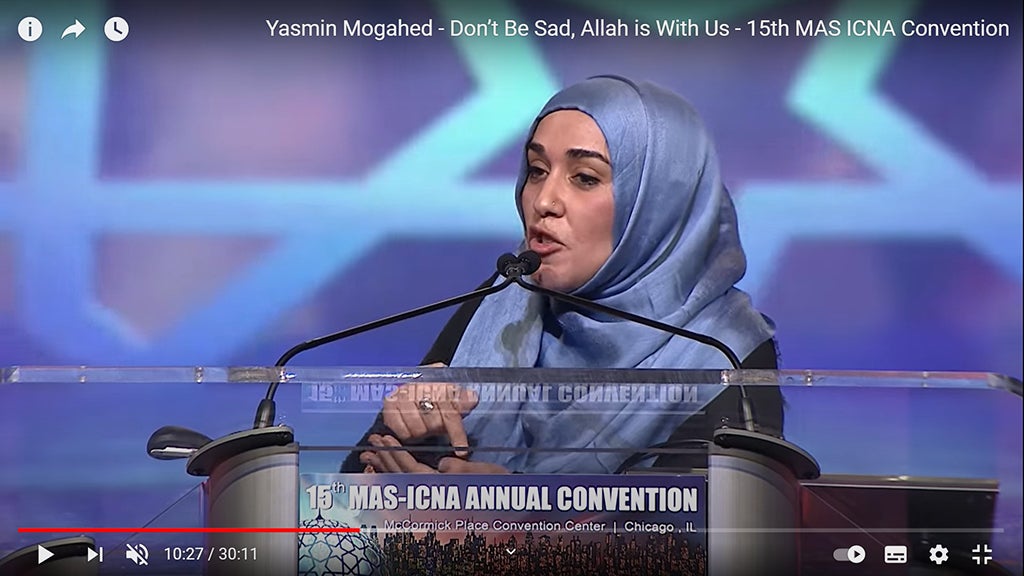Market Da’wa through COVID-19: The Case of American Muslim Preachers on YouTube
contributed by Elad Ben Davi, 30 March 2021
Social media has been an important promoter of market Islam for the past two decades. As the COVID-19 pandemic has in many ways made social media central to the religious public sphere, it seems that the online boom has contributed to further popularizing online da’wa through social media platforms.
The term da'wa means 'invitation' or 'call' to Islam, aiming to spread its message to Muslims and non-Muslims alike. Its primary purposes are guiding Muslims on the right path and attracting non-Muslims to embrace Islam. Since the September 11th attacks, da'wa has been on the rise in America for two main reasons: The phenomenon of Islamophobia and the rise of social media. The hostility against Islam and Muslims after the catastrophe caused many Muslims to realize that they must amend the damaged reputation of Islam and Muslims in America. Therefore, Islamophobia served as an incentive for Muslim Imams and activists to boost their daʿwa activity and criticize Islamic radicalization to improve Islam’s image. The impact and popularity of social media also provided an accessible platform to accelerate this cause by visualizing the message of da’wa to a wider and more diverse audience, which helped to present the peaceful sides of Islam more effectively.
This new reality has shaped a new generation of young American Muslim preachers, who responded to the implications of Islamophobia by using social media as a tool to present Islam and Muslims positively and attractively. This article will address examples of two popular figures regarding the discourse, Nouman Ali-Khan and Yasmin Mogahed.
One of the methods these preachers use to promote Islam entails linking human and global modern challenges to Islamic messages. This can be manifested by focusing on how to avoid anger or jealousy or how to find one’s inner peace, usually derived from the Prophet Muhammed’s deeds or other historical Quranic figures. This helps the preachers to be presented as people who are connected to life rather than alienated religious figures.
This type of virtual preaching activity also creates a sense of solidarity among Muslims, portraying Islam as a religion that has the cure to modern challenges and current calamities. This attitude is relevant especially among young viewers, who can find in the modern teaching of Islam a new form of religious expression more relevant to their daily lives and challenges as Muslim minorities in America and the West. Several examples taken from the YouTube posts of Ali-Khan and Mogahed, will highlight the way in which the COVID-19 pandemic is used as a source to bolster the faith in Allah in the contemporary discourse of Islam.

Figure. 1. The image of Nouman Ali-Khan taken from a screenshot of his ‘Bayyinah Institute’ lecture - ‘Discover your identity’, uploaded on Youtube
Nouman Ali-Khan
Nouman Ali-Khan is an American Muslim of Pakistani origin and the founder of the ‘Bayyinah Institute’ for Arabic and Qur’anic Studies. Ali-Khan is considered one of the most famous Muslim speakers in America, with more than 2.2 million followers on Facebook, and close to 120 hundred million viewers on his YouTube channel. He has also been named one of the 500 most influential Muslims in the world by the Royal Islamic Strategic Studies Centre of Jordan.
In his video, ‘How Muslims Should Respond If Coronavirus Spreads,’ Ali-Khan parallels the feeling of vulnerability and fear from the unknown situation surrounding COVID-19, to the scene of Prophet Moses (Musa) and the Israeli people (Israʼiliyyat) after they crossed the river from Pharaoh (Fara'un) and were all alone feeling helpless in the desert:
“Thousands and thousands of people, men, women and children that have left their home (Egypt) behind… and Fara'un had so much power over the Israʼiliyyat, that he was killing their children in front of them and they could not fight back…that’s how suppressed they were.”
Ali-Khan further explains that in that scene, Moses assured them that if Allah has already saved them from the torment of Pharaoh, they should be confident that He will continue to assist them. From this, Ali-Khan tries to prove that even though the world seems to be in an impossible situation as a result of the pandemic, Allah will not let the Muslims die due to the COVID-19, just as He took care of the people of Israel in the desert.

Figure. 2. Image of Yasmin Mogahed, a screenshot from the 15th MAS ICNA Convention - ‘Don’t Be Sad, Allah is With Us’, uploaded on Youtube
Yasmin Mogahed
Yasmin Mogahed is an Egyptian American who is considered one of the leading female Muslims in the United States. Mogahed is the first female instructor of AlMaghrib Institute, located in Houston, Texas, targeting Western Sunni Muslims. She is regularly invited to speak at annual conventions of American Islamic organizations, such as ISNA (Islamic Society of North America), ICNA (Islamic Circle of North America) and mosques throughout America. Her official Facebook page has 1.1 million followers, and her YouTube channel has gained 290 thousand subscriptions.’
In her clip- ‘COVID-19: Are we being punished?,’ uploaded during last year’s Ramadan, Yasmin Mogahed refutes the assumption that the pandemic is a punishment from Allah to hurt us but instead, a mercy sent by Allah to invigorate the faith of his believers. She parallels the response of the human immune system to COVID-19, to our ‘spiritual immunity’ to challenges, explaining that overcoming obstacles would make us stronger individuals.
Mogahed distinguishes between two sorts of punishment from Allah: “Adab Al-Adna” (lesser afflictions) and “Adab Al-Akbar” (greater afflictions); and stresses that the COVID-19 pandemic should be considered a lesser punishment functioning like an alarm system as an act of mercy from Allah, so we will return to him:
“Imagine that your house is on fire… before you see the fire in front of your eyes, how you gonna know that your house is on fire...? ‘cause you have a smoke alarm that goes off and it beeps… that smoking alarm is intended as a warning, wake-up call, telling you- sort yourself out before your house burns down.”
Therefore, Mogahed emphasizes that the view towards COVID-19 should be observed as an opportunity from Allah to purify our souls and rectify our deeds - a period of self-reflection for us to repent and become better individuals amidst times of uncertainty and fear. Rather than an intentional punishment, the pandemic outbreak during Ramadan is a source to strengthen the religiosity of devotees by reconnecting their Islamic faith to reality.
Conclusion
Those examples manifest how American preachers mobilize understandings of COVID-19 to regain faith in God (Allah), overcome difficulties, and even link the current plague to other historical Muslim difficulties. Those elements manifest that religion, as reflected in 'Youtube da'wa', has become an authority that adapts to social and environmental change, fitting itself in light of contemporary events and challenges.
Therefore, although COVID-19 has presented challenges for daily religious routines, it also has emphasized the crucial importance of da'wa activity on social media platforms (Youtube, Facebook, etc.). In an era where people are in lockdown and forced to limit their physical religious rituals, such as praying in a mosque or gathering in Islamic conventions, the engagement of the 'virtual da'wa' as an independent religious form maintains contact among the Muslim community and preserves the unity of its members through private online mediation.
References:
Echchaibi, Nabil ‘From audio tapes to video blogs: the delocalization of authority in Islam,’ Nations and Nationalism, Vol. 17, No. 1, 2011.
El Naggar, Shaima, ‘The impact of digitization on the religious sphere: televangelism as an example,’ Indonesian Journal of Islam and Muslim Societies, Vol. 4, Num. 2, Lancaster University & Fayoum University, 2014, pp. 189-211.
Hannini, Daniyah M., ‘The “Spiritualization” Of Islam In America: A Study Of Highly Individualistic Forms Of Islamic Practice In The U.S.’, MA Thesis, The State University of New Jersey, 2016
Disclaimer: The views and opinions expressed in this article are those of the authors and do not necessarily reflect the position of the blog editorial team or the Asia Research Institute.
South Asia | Southeast Asia | East Asia | Other Places | Hinduism | Buddhism | Islam | Christianity | Other Religions
Elad Ben David is a Ph.D. candidate in the Department of Middle Eastern Studies at Bar Ilan University in Israel. His research deals with da’wa activity in America. Ben David is also a researcher in the ‘Middle East Network Analysis Desk’ at Tel-Aviv University and the ‘Forum of Regional Thinking.’

